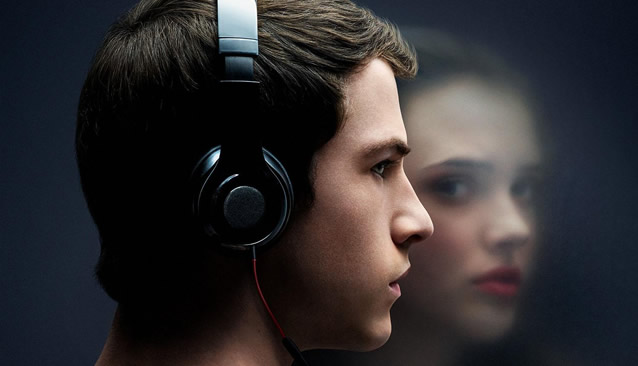TV Series Reviews#1 - 13 Reasons why!

The high schooler took her own life. Everyone's quite sad about it, naturally. They decorate her locker with notes and pinwheels. They engage in mandatory grief counseling to deal with the loss. The school's administration is emailing parents, encouraging them to talk with their kids about it. Watch for warning signs, the messages say. Get help if your student needs it.
But how many of these high schoolers really cared?
Well, Clay Jensen cared. The awkward teen may have struggled to show it at times, but he liked Hannah. Loved her, maybe. He stares at her empty chair, zones out by her memorialized locker. Sometimes he even seems to see her. It's like Hannah's there still—smiling, talking.
Before everything went bad.
One day, Clay goes home and finds a box of old-school cassette tapes on his front porch. He procures an ancient boom box from his father and pops one in, pushing play.
He hears Hannah's voice.
"I hope you're ready, because I'm about to tell you the story of my life," she says. "More specifically, why my life ended. And if you're listening to these tapes, you're one of the reasons why."
Hannah recorded seven tapes before she killed herself. She's left messages on 13 sides, each side dedicated to a person who played a part in her death. Each of those people must listen to the tapes all the way through, no exceptions. And if someone doesn't follow through, Hannah promises that the corresponding taped message will be released through an alternate, much more public, forum. "You're being watched," she cautions.
Hannah Baker may be dead. But she still has something to say. And for those who receive the tapes, it won't be easy to hear. They tell a tragic story, one that's full of unfair rumors and unintended oversights, terrible things said and small gestures left undone.
JUST PUSH PLAY
"You don't know what goes on in anyone's life but your own," Jay Asher writes in his book Thirteen Reasons Why, the story on which this Netflix series is based. "And when you mess with one part of a person's life, you're not messing with just that part. Unfortunately, you can't be that precise and selective. When you mess with one part of a person's life, you're messing with their entire life. Everything … affects everything."
It's a profound and powerful message—one that resonated so much with superstar Selena Gomez that she spent seven years trying to get the book turned into a TV show. "People—no matter what age—you can relate to this story," she told CNN. "Everyone has gone through this. And more than ever, this should be talked about today."
It is indeed a timely story, one that delves into bullying, depression and the byzantine social dynamics of the typical high school. It feels real, and uncomfortably so. Which brings us to an unfortunate paradox.
EATING THE TAPE
13 Reasons Why revolves around high school sophomores—kids too young to vote or drink or even drive. Asher's original book is targeted at a high school audience. Presumably the Netflix show is, too.
But, ironically, the series comes freighted with a TV-MA rating—a warning that the content therein (according to the TV Parental Guidelines) "may be unsuitable for children under 17."
13 Reasons Why earns that prohibitive rating in at least half a dozen ways. F-words and s-words fly regularly, joined by scads of other profanities. High schoolers drink and get drunk. Sex—real or not, willing or not—is very much at issue here. And rumors about Hannah's habits and sexual predilections take center stage in her spiraling depression. As far as the student rumor mill is concerned, it's not about whether Hannah will or won't, but with whom and how often.
And the content grows more graphic as the show goes on. We see sexual assaults and raw violence on screen. Characters engage in (or are rumored to engage in) same-sex relationships. And eventually, we see Hannah Baker—in graphic detail—commit suicide.
Asher and Gomez would say that what we see on 13 Reasons Why reflects high school reality. And honestly, they're probably right. What I saw and heard during my own high school days would've earned a TV-MA rating, too, and I hardly think that things have gotten much better in last few decades. But that doesn't necessarily justify exposing yourself or your teens to this content willingly.
Is it a well-intended show? Yes, I think it's fair to say that it is, as far as that sentiment goes. 13 Reasons Why encourages viewers to really examine their own lives and how they treat people.
That said, shows like this can also have unintended consequences.
Those familiar with the issue of suicide know that the act itself can be strangely and sadly contagious. If someone commits suicide in a given school, the odds go up that someone else will attempt it, too. Why? There are lots of potential factors, psychologists say. But in the emotionally charged world of adolescence, suicide can feel romantic. It can be a shout for attention. It can be revenge.
13 Reasons Why may, unintentionally, romanticize suicide for some students, even though that's certainly not the show's intent. The tricky thing about stories like this one is that, for some, it might be just the right message at the right time. But for someone else, the intended message could also be received in a tragically different way